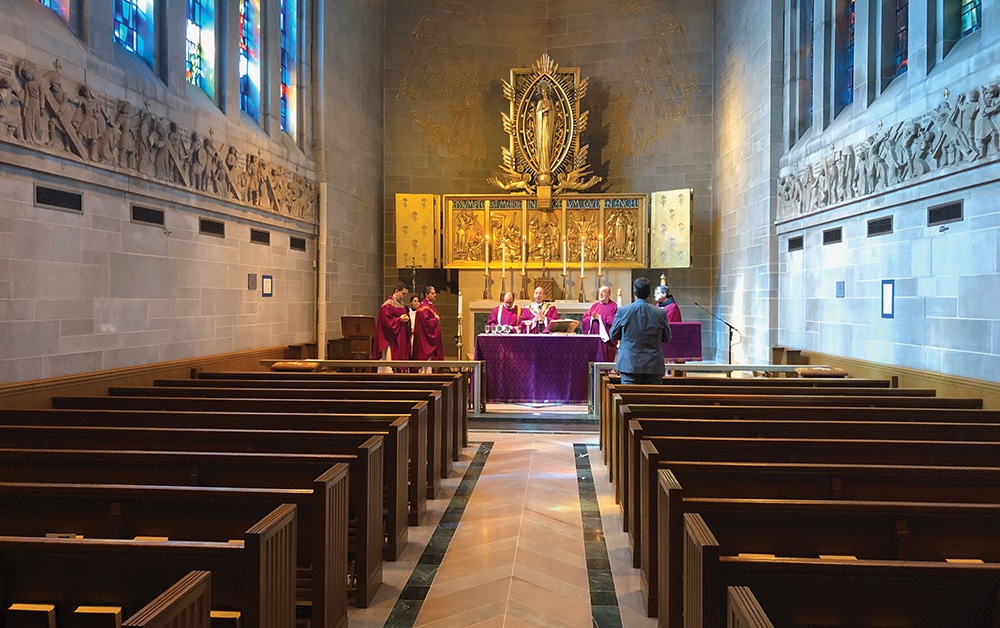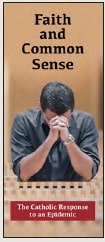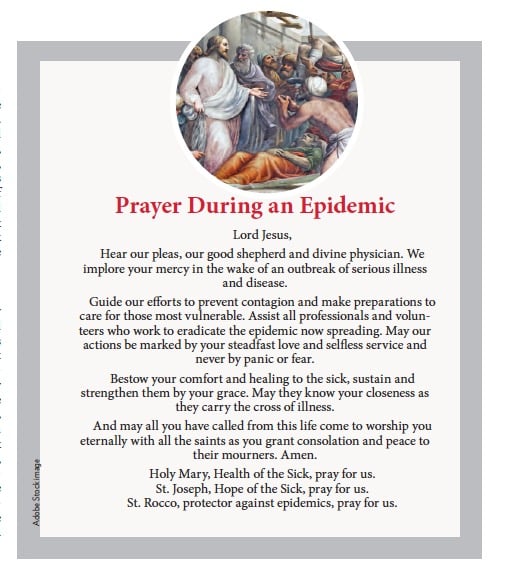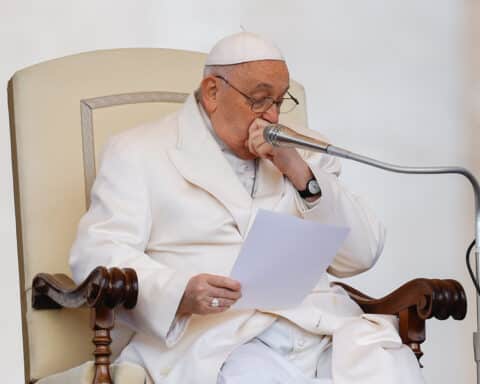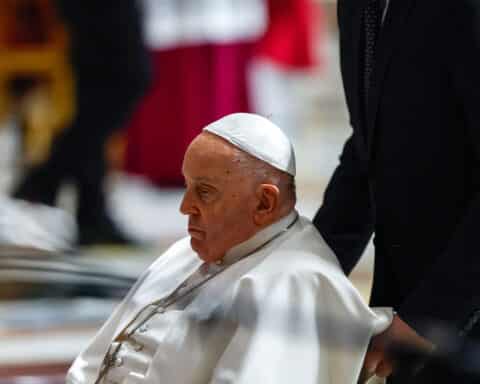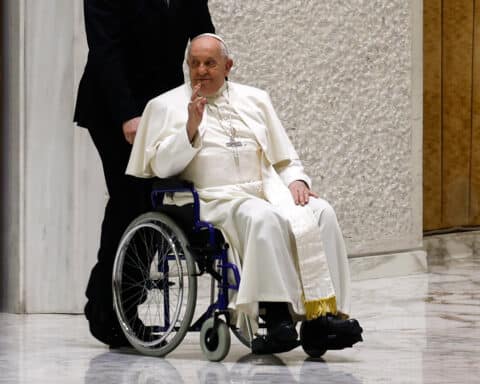Few things are more unnerving than the spread of a disease in epidemic or pandemic proportions. In such a time of uncertainty, it can be tempting to give in to fear and panic. A better response for Catholics, though, is one that is forward-thinking and based on reason, prudence, and reliance on God. Here are some suggestions for how best to respond to the threat of outbreak of any infectious disease.
Plan ahead
It is always good practice to be prepared for any potential crisis. Having a supply of essential items like nonperishable foods, paper products, and prescription medicines in your home is a commonsense practice. During a time when illness is prevalent, it makes good sense also to have on hand basic supplies like over-the-counter pain relievers, cough and cold medicines, and vitamins, as well as cleaning items like soap and disinfectants. As you are preparing your own household, keep in mind those who may not be able to take adequate precautions. For example, check in on a neighbor who lives alone to see what she might need, or call your parish office to see if they need volunteers to help young families or the elderly with their own preparations. Being prepared is key to being able to handle any crisis with grace.
| Related Reading |
|---|
| Christians and the coronavirus: Prepare to lose |
As an epidemic moves from threat to reality, it will be important to observe any recommendations put in place by the local bishop or by your pastor. Depending on the severity of the outbreak, precautions in dioceses and parishes may include increased hand washing, use of hand sanitizer by clergy and extraordinary ministers of holy Communion, suspended distribution of the Precious Blood, emptying of holy water fonts, and the distribution of holy Communion on the hand only. Many dioceses may also recommend skipping the sign of peace or doing a “noncontact” exchange — a precaution often taken during the normal flu season. Individuals should respect all the precautions put in place by the diocese or the parish, remembering that policies are designed to decrease the spread of illness. If the outbreak becomes severe, some dioceses or bishops’ conferences may lift the obligation to attend Sunday Mass. If that should happen, we can commit ourselves to our own private prayer and unite ourselves to the Masses celebrated by priests “in private.”
| A note about holy Communion |
|---|
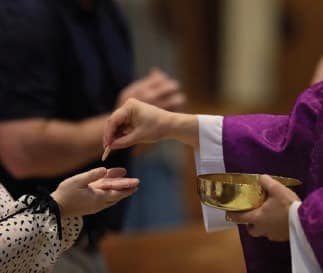 If you prefer to receive holy Communion under “both kinds” — that is, the Body and Blood — it is important to note that “since Christ is sacramentally present under each of the species, communion under the species of bread alone makes it possible to receive all the fruit of Eucharistic grace” (Catechism of the Catholic Church, 1390). It is also worth noting that, in the United States, Communion in the hand is allowed by permission of Pope Paul VI, but the decision on which way to receive (in the hand or on the tongue) ultimately is left up to the faithful, not the extraordinary minister or the pastor. However, the Code of Canon law states that, in view of the common good, “ecclesiastical authority can direct the exercise of rights which are proper to the Christian faithful,” which means that, for reasons of the common good, the bishop may request and urge the faithful to receive holy Communion in the hand (cf. canon 223). Finally, reception of Communion is not a requirement for those attending Mass. Indeed, the sacraments are gifts generously bestowed upon us by our creator, and sometimes we find reason that we should forego the gift for a time. The tradition of the Church has long held that the faithful unable or unwilling to receive the Body and Blood of Christ at Mass might instead participate in a “spiritual Communion” — what St. Thomas Aquinas described as “an ardent desire to receive Jesus in the Most Holy Sacrament and in lovingly embracing Him.” |
Practice prudence
First and foremost, if you’re sick, stay home, even if it means missing Mass. While skipping Sunday Mass is never to be encouraged without cause, illness and risk of infecting others means staying at home is quite reasonable. Use common sense and err on the side of caution. If you are impeded from attending Mass on Sunday or a holy day because of illness, you do not have to go to confession for that reason.
|
Want more coverage on coronavirus from a perspective of faith? Sign up for our daily newsletter.
|
Depending upon the severity of the outbreak, individuals should practice “social distancing.” This might mean limiting, or forgoing, outings to well-attended public places (shopping centers, movie theaters), working remotely if possible, and sitting an appropriate distance (3 to 6 feet, according to the Centers for Disease Control and Prevention) from others at Mass. Avoid any nonessential travel and activities where there are large crowds, including those that are church-related.
The Centers for Disease Control recommends creating a household plan that includes planning to care for those who may be at risk for serious complications; communicating well with your neighbors (social media or neighborhood websites are good for this); identifying aid organizations in your community that you can contact if needed; and creating an emergency contact list and sharing it with your family.
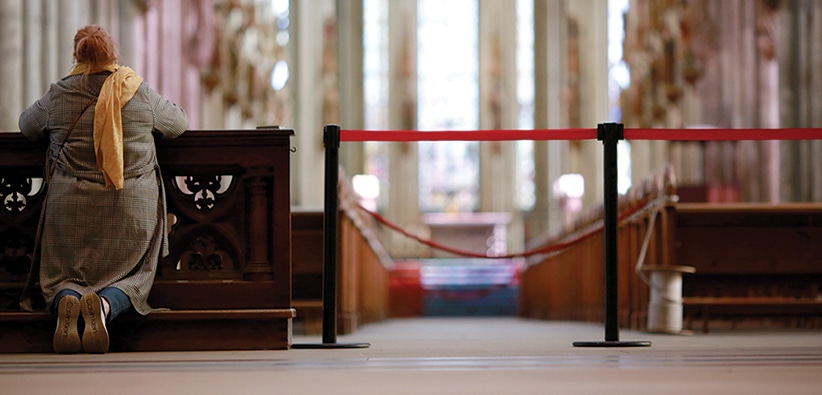
Care for the most vulnerable
During times of crisis, the poor, elderly, or those living alone tend to become the most vulnerable to illness and death. While parishes should keep track of and have a plan for assisting those in need, individuals, to the best of their ability, also should try to maintain connections with those in need. During times of stress, it may be tempting to isolate and insulate, and to put self before others. At those moments, it may be helpful to seek the Holy Spirit’s guidance for how we can best care for our neighbor.
Care for the sick
In the case of a severe outbreak, many individuals will need care. Clergy should follow the diocesan policy when it comes to caring for the sick. In its document “Policies Relating to Planning for Seasonal & Pandemic Influenza (and other Infectious Disease Outbreaks),” the Diocese of Davenport, Iowa, recommends that each deanery should name at least two priests and, if available, two deacons to care for the sick during a pandemic. Laypeople could assist on a voluntary basis.
| Pamphlet |
|---|
|
This In Focus has also been produced as a pamphlet, “Faith and Common Sense: A Catholic Response to an Epidemic,” available to parishes, which will receive a packet of 25 pamphlets with instructions on how to request more based on their needs. If a parish is reading this, has not received a packet by date, and would like to have them, call 1-800-348-2440.
|
Care for the common good
In the event of an epidemic or a pandemic, one’s actions must take into account the common good. Basic everyday actions, as recommended by the CDC, include:
- Avoid close contact with people who are sick.
- Stay home when you are sick, except to get medical care.
- Cover your coughs and sneezes with a tissue.
- Clean frequently touched surfaces and objects daily — for example tables, countertops, light switches, doorknobs, cabinet handles — using a regular household detergent and water. If surfaces are dirty, they should be cleaned using a detergent and water prior to disinfection. Always follow the manufacturer’s instructions for all cleaning and disinfection products.
- Wash your hands often with soap and water for at least 20 seconds.
- Choose a room and bathroom in your home that can be used to separate sick household members from those who are healthy.
Trust in God
During a time of crisis or uncertainty, we may find ourselves struggling with fear and anxiety. This is a natural reaction. But St. Paul reminds us in his Letter to the Philippians to “have no anxiety about anything, but in everything by prayer and supplication with thanksgiving let your requests be made known to God” (4:6), Then, he assures us, “the peace of God, which passes all understanding, will keep your hearts and your minds in Christ Jesus” (v. 7). With steadfast prayer and thanksgiving, then, we do our best to put our trust in the Lord. Let our actions reflect the trust and peace that can only be found in him. Stay close to Jesus and the Blessed Mother in prayer, asking that those who are suffering from the disease or from any related anxiety may find healing and peace.
Gretchen R. Crowe is editorial director for periodicals at OSV. Follow her on Twitter @GretchenOSV.

